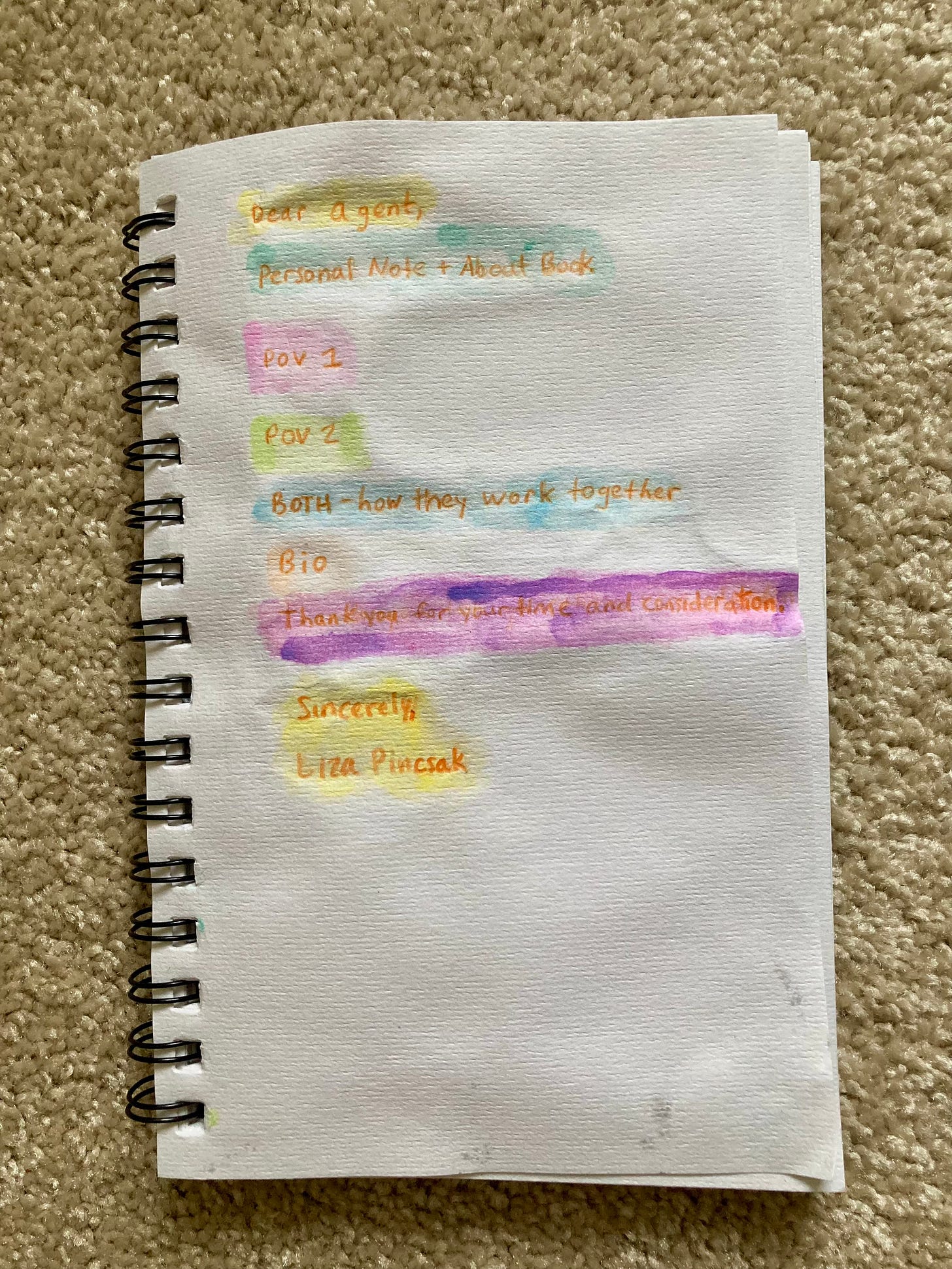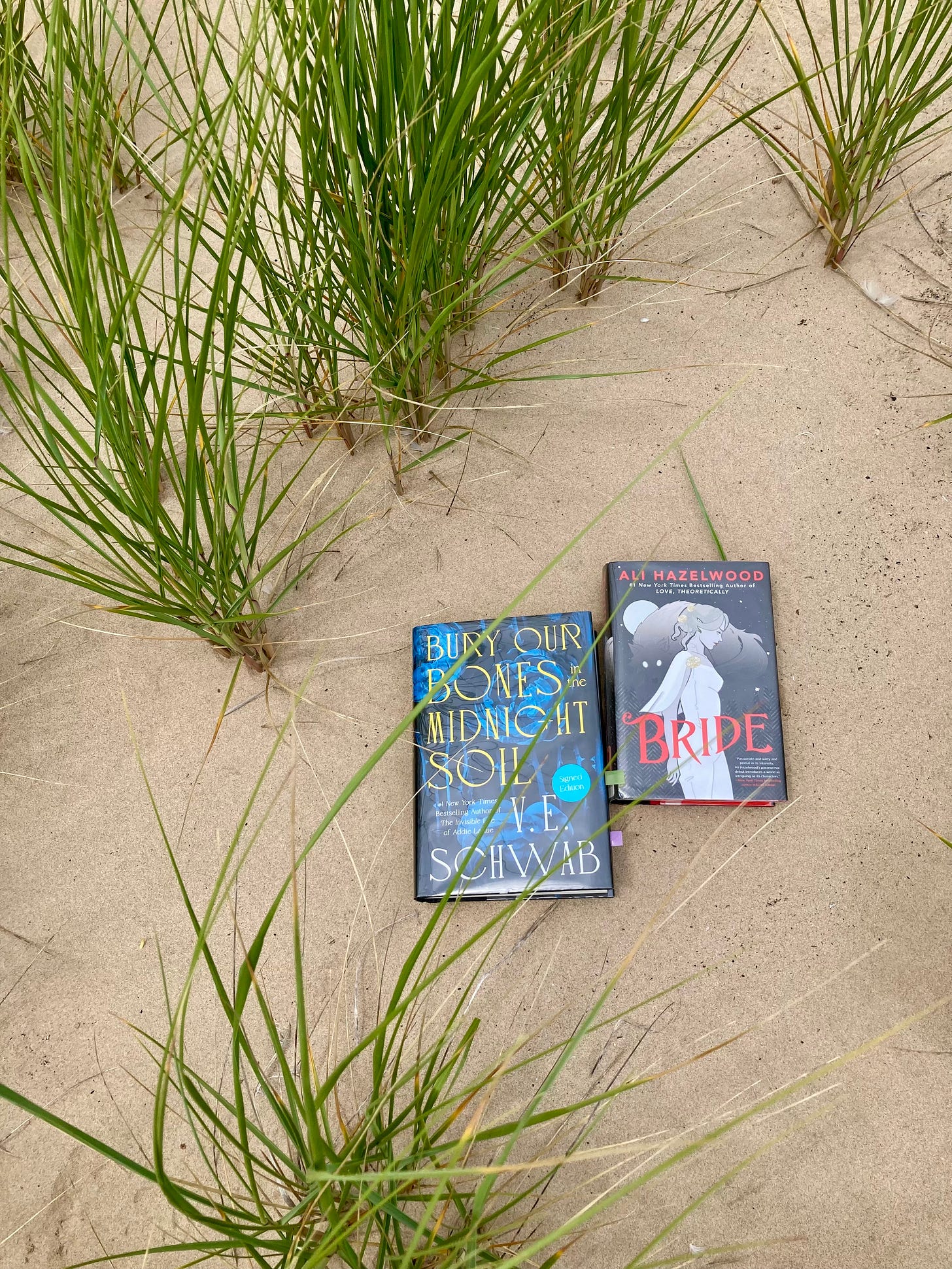Learning How to Write a Query Letter through Trial and Error
Avoid the Mistakes I Made
When you are a writer hoping to turn your manuscript into a published book, the journey doesn’t end when the final page is written. To reach readers and get your story onto bookstore shelves, you usually need to partner with a literary agent. And that means querying. Querying is how you pitch your manuscript to agents. The tricky part is that you not only need to convince them that your story deserves their attention, but also that it deserves their representation. While each agent has specific requirements, getting this right can mean the difference between your manuscript landing in bookstores or staying hidden on your computer.
As part of WFWA (Women’s Fiction Writers Association), I participated in a query workshop, where the agent Lynnette Novak explained the dos and don’ts of writing a query letter based on her professional experience. As part of the workshop, she also read and reviewed my query letter, which meant I had to write one.
Since I’d never done this before, I searched online for the structure, reviewed some examples, and copied the formula to the best of my abilities. I quickly learned that I had written it completely wrong. It turns out there’s an art to writing a query letter.
Below are some of the tips I learned and incorporated into the revised version of my letter.
What I Learned:
1. The structure of a query letter for manuscripts with two POVs is different.
If your book has chapters written from different points of view (POVs), there is a specific way to format the letter. Lynnette Novak broke the structure down in a way that was simple and made sense. (I laid it out in the image above.)
Paragraph 1 includes the optional personal note and information about the book (title, comparison book titles, word count, genre).
Paragraph 2 describes one POV.
Paragraph 3 explains the other POV.
Paragraph 4 discusses how the two POVs work together.
Within paragraphs 2-4, the goals, motivations, conflicts, and stakes for both protagonists should be clear.
Paragraph 5 is a bio.
2. White space.
At first glance, the letter shouldn’t be jam-packed with too much text. And shouldn’t go over one page! That will immediately irk the agent because it means you’ve too much on the page.
3. Don’t add a personal note if it is forced.
Including a personal note is optional. An agent can tell if you’re trying to have something in common with them when you don’t. Don’t force it. This comes off as insincere and rubs them the wrong way.
Bad: I saw online that you liked animals, and I do too.
Improved: Thank you for inviting submissions from attendees of your workshop, Taking the Questions Out of the Query.
4. Title case your book TITLE and COMPS.
I assumed that the comparison book titles would be in italics, as book titles typically are, but that is not the case.
Bad: The Invisible Life of Addie LaRue
Improved: THE INVISIBLE LIFE OF ADDIE LARUE
5. Don’t give too much away!
My first version of the query letter was essentially a condensed synopsis of the book. But a query letter isn’t a summary! I was not only giving away the ending, but also the climax, and too much about the plot. A query letter is more of a teaser, similar to what’s written on the back cover of a book, designed to pique the agent’s interest in reading more.
Bad: Lena defeats the alien warlord, saves Earth, and reunites with her lost brother in the final battle.
Improved: Lena must risk everything to find her brother—and stop a war only she can end.
6. Don’t use rhetorical questions!
Agents don’t like them. In both versions of my letter, I included them and was repeatedly told that it’s much stronger to rephrase them. So I did.
Bad: Boys who are dismissed seem to disappear. Never to be seen again. Are they executed? Sold into slavery? Eaten by aliens? All Larry knows is that he certainly doesn’t want to find out.
Improved: Boys who are dismissed seem to disappear. Never to be seen again. Larry doesn’t want to be next.
7. It’s okay to share personal things in the bio.
I needed to spice up my bio! Additionally, it can be written in either the first or third person. If it’s the third person, start with your name.
Bad: She lives in Sheboygan, Wisconsin.
Improved: Liza Pincsak lives in Sheboygan, Wisconsin, known as the “Malibu of the Midwest,” where she walks the shoreline in the summer and skis the quiet trails of winter.
8. Don’t waste time and space on things.
If something is implied or assumed, it shouldn’t be included. In the example below, the sentence can be deleted because the agent assumes the full manuscript is ready and available if you’re querying.
Bad: The full manuscript is available upon request.
Improved:
The full manuscript is available upon request.
9. Don’t include your phone number.
The agent already has your email from where you submitted your query letter. Including your phone number gives the agent the upper hand because they can call you at any time, which may catch you off guard and leave you unprepared. It’s best to have them email you about setting up a call, so you can prepare for the chat by researching the agent beforehand.
Bad: Sincerely, Liza Pincsak [Insert email address] [Insert phone number]
Improved: Sincerely, Liza Pincsak
10. It’s okay to mention the possibility of a sequel, but don’t write it.
In an ideal world, I’d love for Book 1 to be a duology. However, a second book isn’t a guarantee even if the first book sells well. So, it is important that the book, especially a debut novel, is a standalone. Even if I have ideas about the second book in the series, I’ve been repeatedly advised not to write the sequel until Book 1 sells.
Some reasons for this advice are:
Agents might ask, “What else are you working on?” It’s better to have a new, fresh project to tell them about rather than more of the same thing that might not sell.
It’s okay to write the synopsis and maybe the first few chapters, but by the time Book 1 is published, what the sequel is about might have significantly changed. So it’s not worth wasting time on it.
Bad: It’s the first in a trilogy, which I’ve already written all the books.
Improved: It’s a standalone, but it has the potential to be part of a duology.
Getting Over the Hurdle
I was dreading writing my query letter because it’s often the only thing the agent sees when they’re determining if they’re interested in my story. That’s a lot of pressure. But when I sat down to write, it was actually fun.
Clearly and concisely articulating the main ideas of my manuscript was a helpful exercise and made me consider whether I’m clearly articulating these same points in my manuscript. Additionally, I appreciated receiving feedback from other writers and an agent. That helped me stay motivated to continue improving it.
However, I haven’t tested my query letter yet, so I don’t know if it is successful. I’d define a successful query letter as one that prompts agents to request my partial or full manuscript. If it is a successful query letter, I can share it later on. It can be helpful to see examples of successful query letters.
Book Talk
I enjoy fantasy, but I tend to prefer stories about witches over those about vampires. And yet, I somehow ended up reading two books about vampires.
The Let’s Get Cozy Book Club podcast is reading Bride by Ali Hazelwood. You can read along with us and listen to the podcast to hear our thoughts on it.
While reading Bury Our Bones in the Midnight Soil by V. E. Schwab, it gave me The Invisible Life of Addie LaRue vibes. If you liked Schwab’s previous book, you’ll definitely enjoy her new one. The novel follows the narratives of three different characters—two from the past and one from the present. It’s fun trying to figure out how they’re all connected and where the story is going to go.
Conclusion
Writing my query letter was a big goal that I wanted to complete this summer. Dipping my toe in the upcoming stages of my writing journey is exciting because I get to imagine a day when Book 1 is complete and my work is out in the world. With the query letter and synopsis done, I can focus on finishing my manuscript so I’m ready to query in Spring 2026.
Taking a course on how to write a query letter from an agent and receiving feedback from both an agent and fellow writers was super helpful. I highly recommend including this as a step in your writing journey to becoming an author.
Sending you lots of cool breezes and fairy dust,
Liza





